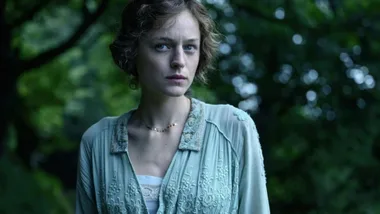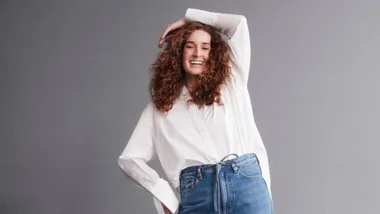“I wish someone had told me about this sooner”
Tracey Cameron, 50, age care nurse
As a teenager, my monthlies were regular but heavy, and I was put on the Pill to reduce the flow.
This was successful, but as I got older I found that I was having trouble controlling my weight. By the time I was 25, I was putting on more weight and decided to come off the Pill. And that’s when the heavy periods started again.
I put up with it for years, thinking it was part and parcel of being a woman. But it was really interfering with my life, and after five days of having my period I felt drained. I didn’t realise I was more than likely iron deficient.
My first experience of what I call ‘hemorrhaging’ happened when I was 45 and living in the UK with my 10-year-old daughter. Walking around York, I had “a flood” of bleeding and had to sit on a public toilet for 15 minutes. When I thought it was over I hurried to the nearest bus stop to get home – but as I sat there on the bus I could feel the flooding again. I knew I had no room left on my tampon and sanitary pad and I could feel the warm on my jeans. I sat on a plastic bag I had so I wouldn’t get blood on the seat, but it just kept coming and coming. Thank god I was the second-to-last person to get off.
The second time it happened was at my sister’s home in Perth, Western Australia. I saw the signs of a flood coming and was stuck in my sister’s bathroom for 20 minutes. I had a five-day period in half an hour. I was white as a ghost and so exhausted I had to sleep for 3 hours before I could drive home.
By now my iron was so dangerously low I had to have 100 mls of Iron infused into me. My eyesight had become poor, my memory was so poor I could not remember what I had just been told and had to have it repeated to me. I could not stop chewing ice and I was so drained all the time.
Over the years, I’d seen numerous doctors and was so sick of it all I was ready to have my uterus removed. Then in August 2014 – after the worst flood yet which saw me bleed through three adult-type nappies – I went to see a young gynaecologist who suggested endometrial ablation. Three weeks later I had the procedure.
Now, more than two years later, I can go for four, five or even seven months with no period. I have no cramps, no fluid retention and no hormonal emotions. My Iron is where it should be, and my memory is great. It was the best thing I ever did and I would be the first to recommend it. It has been life-changing. I wish someone had told me about this so many, many years ago.
To find out more about endometrial ablation visit WearWhiteAgain.
‘I’m glad I didn’t suffer in silence’
Anna, 36, public relations director
As a teenager, I always had period pain, but my mum and my GP both told me it was something I’d grow out of, so I was never particularly worried about it. I’d just pop a few painkillers, reach for a hot water bottle and get on with my day.
I’d heard awful stories about women throwing up or fainting when they got their period, and since that wasn’t happening to me – the worst I had was diarrhoea – I didn’t think my period pain was anything serious.
It wasn’t until my early thirties that I became aware that the pain was getting worse every month. It would wake me up at night, and I’d have to get up and take a couple of ibuprofen tablets. Soon, two tablets weren’t working and I upped my dose to three at a time.
Eventually, I decided to go and see a gynaecologist, who told me that my symptoms sounded like endometriosis, a condition where endometrial tissue is found outside the uterus (where it’s supposed to be). The only way to confirm the diagnosis was to have a laparoscopy under a general anaesthetic.
I’d never had a general anaesthetic – and if I’d realised that I’d be bed bound for nearly a week I may have thought twice. However, I agreed to have the procedure, and the doctors discovered that I did, indeed, have extensive endometriosis and polycystic ovaries. It turned out the endometriosis was most severe on the wall adjoining my bowel, which was why I experienced diarrhoea every month. The endometrial adhesions were scraped out of my uterus, which instantly relieved most of the symptoms. I also went back on the contraceptive pill (which I’d gone off as I didn’t like the side effects) to keep the endometriosis at bay.
After the diagnosis, my gynaecologist urged me to have children soon, as endometriosis can cause fertility problems. I took her advice, and my husband and I now have a two-year-old daughter and a second baby on the way. But I dread to think what might have happened if I hadn’t decided to visit that gynaecologist or had been turned off by the general anaesthetic and just suffered on for a few more years.
‘I used to think the pain was normal’
Tamara, 33, conservation manager
People don’t generally talk about the pain level of their period enough to understand what is and isn’t normal. For me, it feels like you’ve got a gremlin trying to tear your insides out, this horrible clawing, grabbing, clenching pain. I can’t even stand up straight when the pain does kick in.
As a teenager, my reference point for my pain level was my mum. I was going off her experience—which was high pain—and I always thought it was normal.
I had very heavy periods, and would need super pads, super tampons plus toilet paper. The first night would always be the worst and I’d be so paranoid about flooding the bed that I wouldn’t sleep, I’d be up every half hour.
In my 20s I had exploratory surgery, a laparoscopy, and was diagnosed with endometriosis then.
But more recently, I had a whole series of immune-related problems that made me realise I was getting too run down. I kept needing to take days off work—and I’m pretty tough—but I wasn’t coping with the pain level.
I was diagnosed with adenomyosis on June 1 this year during an internal ultrasound. My doctor described it as similar to endometriosis, but inside the uterus muscle wall and therefore it’s not able to be excised. That is what had been causing hip pain and excruciating periods. High fatigue, too.
I booked an appointment in June this year and from there was scheduled in for endometriosis excision surgery. Basically, my entire lower abdomen was riddled with endometriosis, plus it’s all in my uterus wall. The surgery went well, I’m still in the recovery phase. Part of the treatment is also a chemical menopause to slow down the growth of the adenomyosis.
The only treatment to eliminate adenomyosis is a hysterectomy and they’ve classified me as two young at 33 to justify it. Because I don’t have children they believe I might change my mind because of my age bracket, even though I’ve made my decision.
My advice to other women? If your period or the pain is impacting on your ability to function, tell your doctor it’s not normal. If you don’t agree with what you’ve been told, go get another opinion. If you experience debilitating pain and your doctor is fobbing you off, go see someone else.
‘It was a nerve-wracking decision’
Hayley Neale, 45, checkout operator
My heavy bleeding started about April 2013. Before then, my periods were normal. I’d been induced with both my kids so I’ve never felt a natural water break, but that’s how my first bleed was. It was horrific. It covered both my legs and I had a sponge-like clot in my underwear. At the end of my [work] shift, I quickly went to my locker and had to use about three pads before I could even attempt to leave.
I rang my GP straight away. He decided to try me on some medication to curb the bleeding. I was on it for about two years, but it made no difference. On the second day of my period, I would always get heavy bleeding and feel that awful feeling of the lining of my uterus coming away. I dreaded working in case it happened. “Heavy” pads were useless – I ended up using incontinence pads to help hold in fluids.
I was eventually referred to Women’s Health at my local hospital, where I had a pap smear and was booked in for a dilatation and curettage (D&C) to scrape away the womb lining, as they noticed a polyp and thought that might be causing the heavy bleeding.
It wasn’t, so I was given two choices – the Mirena IUD or endometrial ablation. It was a nerve-wracking decision. I didn’t know much about endometrial ablation, but I didn’t feel that hormonal therapy was right for me (I wanted a more permanent solution).
I was booked into my local hospital a few weeks later and under general anaesthetic had endometrial ablation. It’s a minimally-invasive, quick and simple procedure which involves removing the lining of the uterus. The surgery went well and I was home later that day. The odd headache and sore boobs (which only lasted a day) settled pretty quickly.
I had blotting for a couple of weeks afterwards; and I was still nervous for a sudden flood, but after two months of no bleeding – not even a spot – I started to feel confident that this nightmare had ended. It’s now been over 12 months since I had the operation and I no longer have heavy periods. I’d never heard of endometrial ablation, but it has changed my life. I just wish I’d had it sooner.











